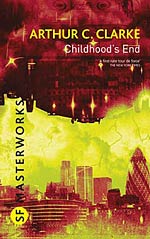
![]() snakeoil
snakeoil
1/20/2012
![]()
This novel, released in 1952, is the one that made Clarke’s name as an author of SF. It has spawned many of its own children, not least amongst their number being the TV series ‘V’, the premise of which is based upon the first part of this book in which an apparently benevolent alien race hovers in the sky above the world’s greatest cities and, without allowing their physical bodies to be seen, ensure that Earth becomes a utopia for humanity. There are those amongst the humans who suspect the motives of the aliens, now known as ‘Overlords’, but most do not question their benificence. As a premise, ‘V’ took this and didn’t exactly run with it but rather put it on ice. Clarke, however, continues what would have made a pretty good novella into something that is, frankly, stunning.
Clarke’s forethought for this book is second to none. Every single plot element drives forward the narrative, usually only coming to fruition much later in the novel, and yet none of it feels set up. The characters and their motivations are all fresh and believable, yet all are following a path laid for them by Clarke’s plan. However, it is not in the characterization nor the planning of the novel that this book’s greatness lies. It is in the sheer pathos that Clarke’s idea inspires in the reader. Instead of what could have easily become a bleak ending, bleaker even than the prophecy of Karellan that ‘humanity is not meant for the stars’, we get first an overwhelming sense of the importance of both chidren and the experience of childhood to mankind, followed by a beautifully set up denouement that completely short circuits any lingering negativity, despite the absolute finality of the action.
In summary, this is one of the best stories I have read. The last one to impress me so much was I Am Legend, but where that tale turned one’s expectations on the final paragraph, Childhood’s End stuns you with its enormity and breadth of scope, and then carries on to even greater heights. Along the way, Clarke casually drops in idea’s or sentences that are either remarkably prescient, or worthy of full novels in their own right. This book has more such gems than any writer normally produces in a lifetime. An astounding work that is justifiably regarded as one of the greatest novels in the SF canon.
To divert the ending of this review away from effusive praise, and perhaps to get a bit spoiler-y, it would perhaps be an interesting exercise to look at the apotheosis of humanity as represented in Childhood’s End and compare and contrast it with modern singularitarian fiction, particularly in regards to conciousness uploading and the technological transsubstatiation as opposed to a psychic one. Clarke’s last novel, The Last Theorem deals with such a mass upload of conciousness, and perhaps this would be a good place to start.
http://snakeoilreview.wordpress.com/